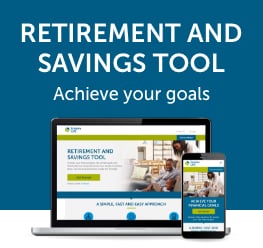
Updated February 2024
Do you ever wish you could talk to your younger self about lessons you've learned, more than a few of them the hard way? There are the mishaps you could have avoided, the errors in judgement you could have missed and the regrets you wouldn't hold. How much better would you feel now if you could turn the clock back? And that includes the extra money you would have to fund the better lifestyle you could look forward to in the decades ahead. Let's consider some financial tips.
70% of Millennials are not saving enough for retirement.1
A November 2022 study found that the average retiree started saving at age 37. They wished they had started saving at age 28, almost a decade earlier. While 6 in 10 of those within 10 years of retirement are making contributions to their retirement accounts, less than 1/3 have a comprehensive financial plan to guide them in their journey.2 Even less have a retirement income plan that includes lifestyle planning.
More than three-quarters of the Canadians aged 35-54 who were surveyed have a key message for those who are younger than they are: start saving earlier.3
Back then, living in the now seemed to be the way to go, enjoying each of life's moments. Instant gratification felt great, whether you were taking a break from your studies to buy that gadget “everyone had,” or treat yourself to a night out with some friends. You didn’t need cash; you had a new credit card. You could make minimum payments over time. They were easy to budget. You deserved it, right?
In a few years that $1,000 credit card limit would be raised to $10,000 and the interest payments alone would be more than the total balance back in school. No worries; you were now working. You could pay off the credit card and the school debt. You could even start to save some money.
You were trading instant gratification for deferred pain. The pain later on would be much more intense and the sour taste of "a good deal or money better spent" would linger on longer than the sweet taste you savoured during that “now” moment. You know that now, all too painfully.
My dad lived by the following principle. When you’re tempted to buy something you don’t have the cash for, don’t buy it! If you added the cost of financing to the purchase price, that purchase doesn’t look like such a deal. In fact, some of the things you bought went down in price or got flushed through your system while you continued to pay for it for years. That’s where want turns to waste.
3/4 of Canadians aged 55-64 have saved $100,000 or less; almost half saved less than $5000.4 It’s small wonder that people are worried that they will run out of money in their later years and that so many see work as an integral part of their lives past traditional retirement age.
Debt should still be a four letter word, instead of just a word.
Statistics Canada reported that we owed $1.80 for every dollar of disposable income in the second quarter of 2023.5 Unfortunately, these high debt levels have been going on for decades, spurred on by years of low interest rates and people buying homes, new cars and toys for the house. Debt has been normalized. It’s at the expense of saving for the long term and a retirement that will also be long term.
As you move from your first job to your next, your income goes up. You think you will be in a better position to pay down your debt. However, rather than deal with your existing debt and spending practices, you get distracted by the next big purchase, some new furniture, a new car, and a house. Then a child comes along, perhaps two or more. The house needs fixing, the furnace blows, and you want your home to look like the makeovers on television. Debt is a huge strain on household income and even relationships.
It's good to know that getting out of debt is important to most Canadians. Almost 6/10 plan to reduce spending on vacations and fancy meals/restaurants; more than 4/10 plan on reining in spending on clothing, utilities, internet and home entertainment packages and even the type of food they buy and the waste they generate.6 A quarter of Canadians even plan to work more to generate money to reduce debt. Even with all of this, you're paying everyone else.
When does your money start to work for you? Here are some tips.
1. Pay yourself first |
2. Start early |
3. Start your long term savings plan early in life |
4. Accumulate money by focusing on deposits and time, not rate of return |
5. Identify and write down your financial and future lifestyle goals |
Time seems to be something you have less and less of as you get older. And it moves faster and faster. Even if you have some financial smarts, use that to find a better financial professional. Engage the services of an accredited financial advisor who can help you with life’s financial challenges today so that you will have fewer of them tomorrow.
You can’t go back to your younger self. You can still get a better handle on your financial affairs today. You can pay it forward to others younger than you. You will feel better about it and so will they.
1 "Pollara Insights, Oct. 25, 2022", Edward Jones Canada. Accessed Feb 20, 2024.
2 "Longevity and the New Journey of Retirement, 2022," June 2022, Edward Jones and Age Wave. Accessed Feb 20, 2024.
3 “Gen X has the largest wealth gap of any generation, and it means ‘the American Dream of retirement is going to be a nightmare’ for them” Dec. 15, 2023, Fortune. Accessed Feb 21, 2024. “A Generation Rolls Its Eyes at Retirement,” May 18, 2023, ThinkAdvisor, Allison Bell. Accessed Feb 21, 2024. “Gen X: Retirement Revised,” June 2023, Prudential Pulse Survey. Accessed Feb 21, 2024.
4 "2023 Canadian Retirement Survey," Healthcare of Ontario Pension Plan (HOOP), April 2023. Accessed Feb 20, 2024.
5 “Canada Household Credit Market Debt to Disposable Income," Dec. 13, 2023, Statistics Canada 2023. Accessed Feb 20, 2024.
6 "How are Canadians getting out of debt in 2023," May 23, 2023, 2023 BDO Affordability Index. Accessed Feb 20, 2024.
© 2019-2024 by Peter A. Wouters. Republished with permission by Peter Wouters. For the complete list of articles, please visit here.
Related articles:
Life & Money Matters: Pay Yourself First
Life & Money Matters: Accumulating Money - Three things you need to know
Inflation and financial planning
This document reflects the views of The Empire Life Insurance Company as of the date published. The information in this document is for general information purposes only and is not to be construed as providing legal, tax, financial or professional advice. The Empire Life Insurance Company assumes no responsibility for any reliance on or misuse or omissions of the information contained in this document. Please seek professional advice before making any decisions.
Policies are issued by The Empire Life Insurance Company. ® Registered Trademark of The Empire Life Insurance Company.
Updated February 2024

